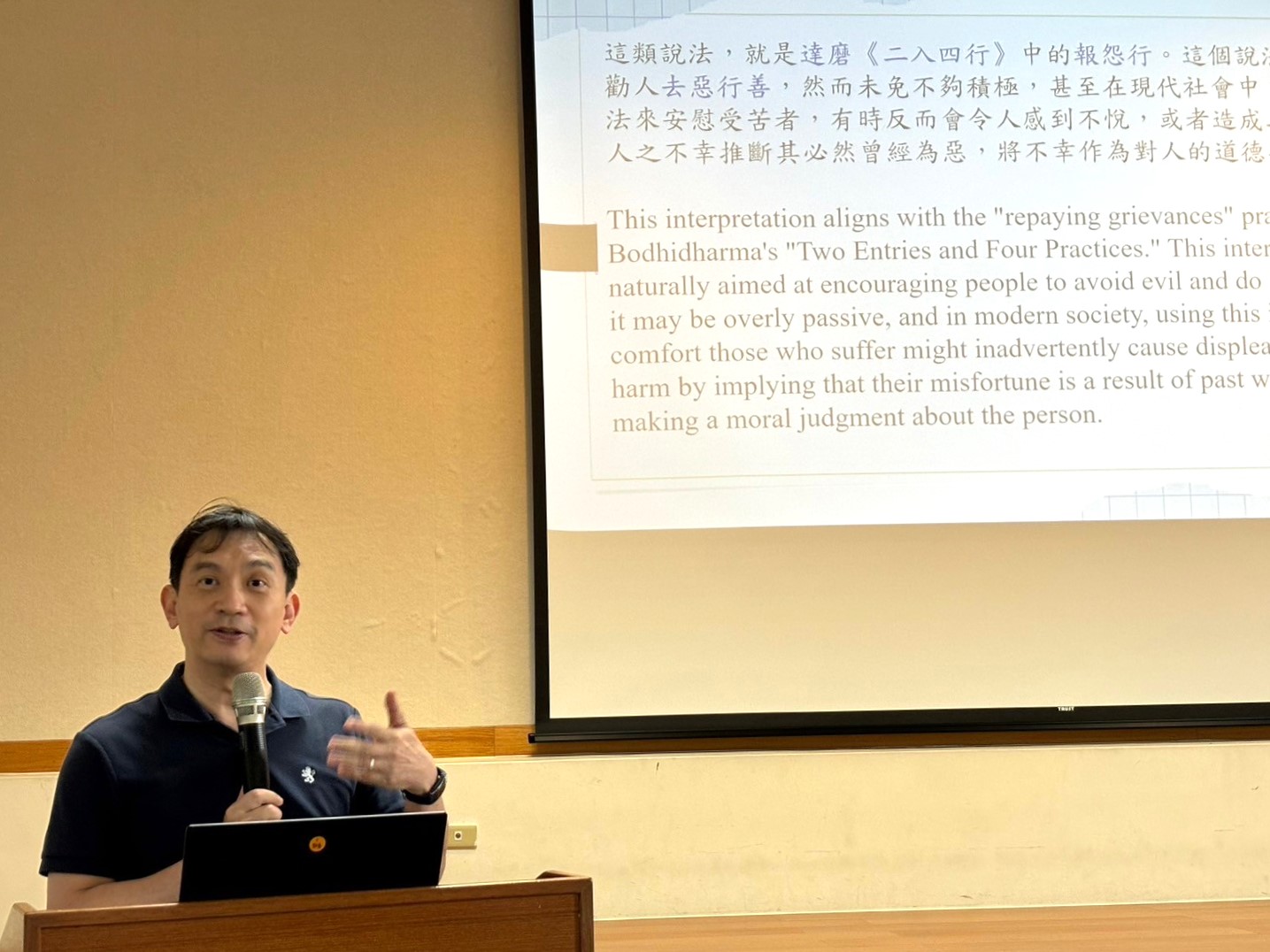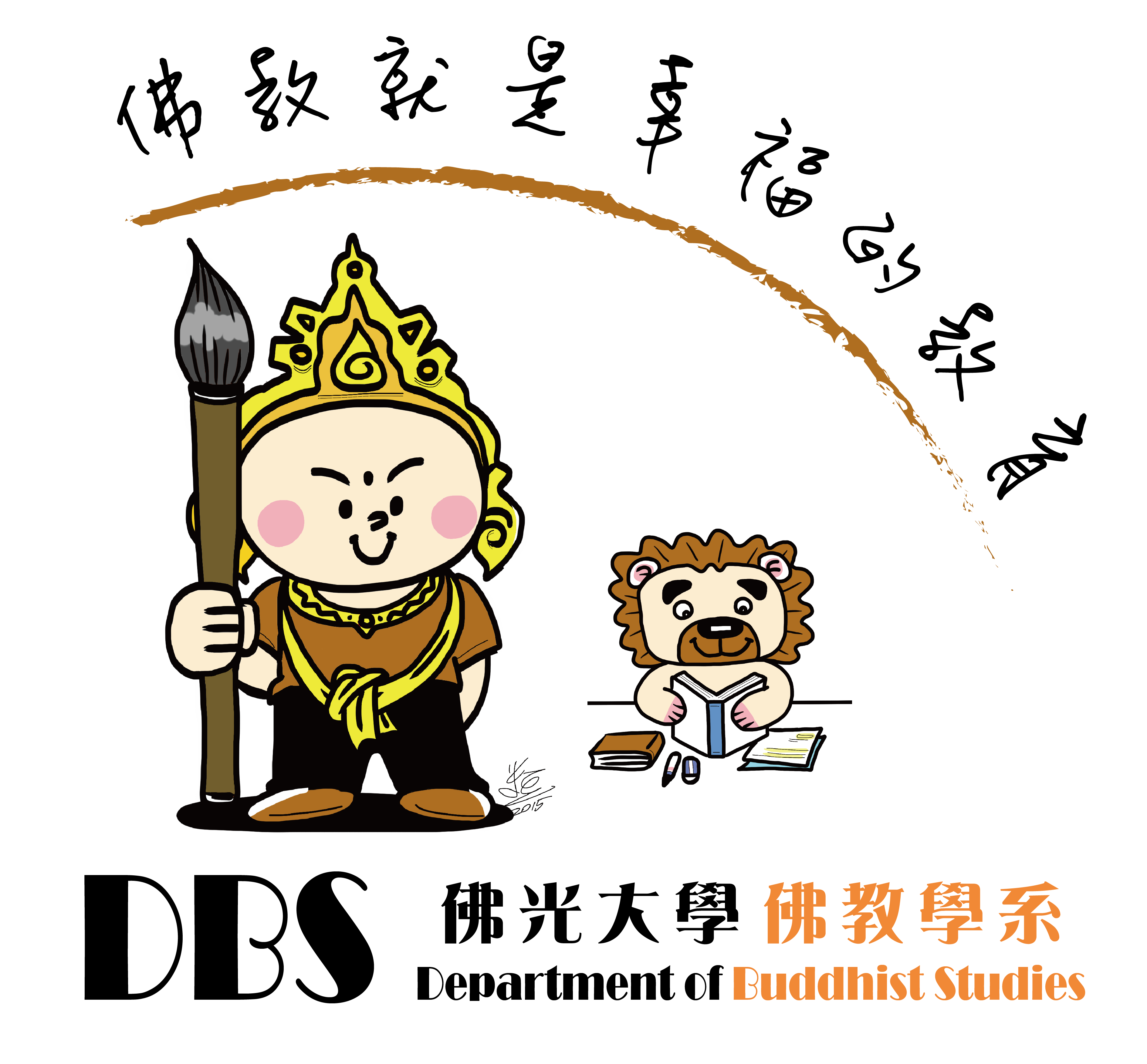文 / 郭朝順院長
Repaying Debts or Returning Favors
Dean’s 112-2 End-of-Semester Address to the Entire College
最近在常在課堂或在學術會議中提到一個說法,業種可以被理解為一種文化概念,因為就唯識學而言,業種的是為名言熏習所成,名言就是我們賴以理解並表達一切對象的語言文化,它是構成眾生阿賴耶識的基本形式。將業種理解為文化概念,可以包含將業視為「債」,或者視為「恩」的兩類說法。現在就對這兩種說法稍微談談。
Recently, I have often mentioned in classes or at academic conferences that karma seeds can be understood as a cultural concept. According to Yogācāra, karma seeds are formed through the conditioning of language and culture, which is how we understand and express all objects. This language culture forms the basic structure of the ālayavijñāna (store consciousness) of sentient beings. Understanding karma seeds as a cultural concept can encompass two interpretations: viewing karma as a "debt" or as a "favor." Let me discuss these two interpretations briefly.
將業視為債的說法,常常出現在強調因果報應的善書中。這類善書往往會強調:今生所受之苦即是償還過去所造諸惡業,而今生所造諸惡業,便得由來世償還。所以若生了不肖子女,父母便會說是來討債的;碰到不幸的事情,就會自我安慰地想,這是業報。這類說法,就是達磨《二入四行》中的報怨行。這個說法自然是為了勸人去惡行善,然而未免不夠積極,甚至在現代社會中,若用這個說法來安慰受苦者,有時反而會令人感到不悅,或者造成二度傷害:由人之不幸推斷其必然曾經為惡,將不幸作為對人的道德判斷。
The notion of viewing karma as a debt often appears in Chinese folk texts known as ‘precious scrolls’ that emphasize cause and effect retribution. Precious scrolls tend to stress that the suffering we endure in this life is the repayment of the evil deeds we committed in the past, and the evil deeds we commit in this life will be repaid in future lives. Therefore, if one has unfilial children, parents might say they are here to collect debts; when encountering misfortune, one might console oneself by thinking it is karmic retribution. This interpretation aligns with the "repaying grievances" practice in Bodhidharma's "Two Entries and Four Practices." This interpretation is naturally aimed at encouraging people to avoid evil and do good. However, it may be overly passive, and in modern society, using this interpretation to comfort those who suffer might inadvertently cause displeasure or secondary harm by implying that their misfortune is a result of past wrongdoing, thus making a moral judgment about the person.
如果從報恩的角度來解讀的話,人生在世有幸與不幸之事,幸福之時固然勿忘受之於人的恩德,然而由幸轉為不幸之時,更勿忘記原本所曾受的恩德之可貴,更不要只是怨恨此時之不幸,反而要努力創造令自己及旁人幸福之條件。一切的幸與不幸皆是諸因緣所成。若有人從一生下來,從沒有嚐過幸福的滋味,則我們更應憐憫他,令之經歷到可以潤澤其生命之幸福甘露,這便是在回報我們曾受之於人的恩德。
If we interpret it from the perspective of returning favors, in the fortunes and misfortunes of life, we should not forget the kindness we have received from others during times of happiness. However, when fortune turns to misfortune, we should remember the preciousness of the kindness we once received and not merely resent the current misfortune. Instead, we should strive to create conditions for happiness for ourselves and others. All fortunes and misfortunes arise from various conditions. If someone has never experienced happiness since birth, we should feel even more compassion for them and strive to bring them the nectar of happiness that can enrich their lives. This is how we repay the kindness we have received from others.
以報恩而非償債的觀點,來解讀業報時,我們將更能體會,何以星雲大師在世界各地的道場建立滴水坊,因為:「滴水之恩湧泉以報」。報恩不是償債。若是償債會有債主、債權,因此還債須還給特定債主;若是報恩,則是將所受恩德回報天地萬物及每一眾生。還債的業報觀,只教人忍受,報恩的業報觀,則是如大師倡導三好四給,創造人間的良善業報循環,以令淨土在人間實現。
By interpreting karmic retribution from the perspective of returning favors rather than repaying debts, we can better understand why Venerable Master Hsing Yun established the Dripping Water cafes in his temples worldwide, because "a drop of water shall be returned with a burst of spring." Returning favors is not the same as repaying debts. Repaying debts involves a creditor and a debtor, requiring the debt to be repaid to a specific creditor. Returning favors, on the other hand, involves repaying the kindness received to all beings and everything in the universe. The karmic view of repaying debts only teaches endurance, while the karmic view of returning favors, as advocated by the Venerable Master through the Three Acts of Goodness and the Four Givings, creates a virtuous cycle of karmic retribution, bringing the Pure Land to the human world.


 佛光大學 佛教學院/佛教學系
佛光大學 佛教學院/佛教學系


















